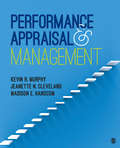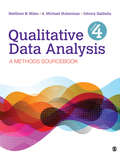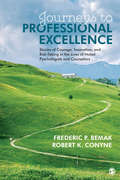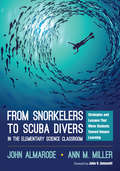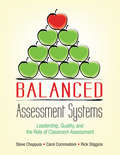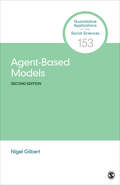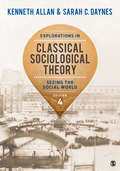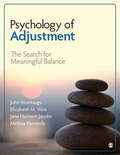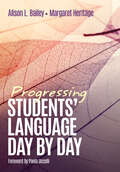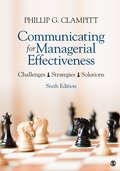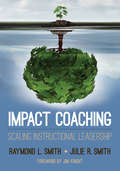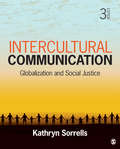- Table View
- List View
Performance Appraisal and Management
by Kevin R. Murphy Jeanette N. Cleveland Madison E. HanscomOrganizations of all sizes face the challenge of accurately and fairly evaluating performance in the workplace. Performance Appraisal and Management distills the best available research and translates those findings into practical, concrete strategies. This text explores common obstacles and why certain performance appraisal methods often fail. Using a strategic, evidence-based approach, the authors outline best practices for avoiding common pitfalls and help organizations achieve their maximum potential. Cases, exercises, and spotlight boxes on timely issues like cyberbullying in the workplace and appraising team performance provides readers with opportunities to hone their critical thinking and decision-making skills.
Qualitative Data Analysis: A Methods Sourcebook
by Johnny Saldaña Matthew B. Miles A. Michael Huberman"This comprehensive, practical, user-friendly book provides a wealth of data analysis strategies that are essential for any qualitative research. It is a must-have tool book for moving from data analysis to writing for publication!" –Guofang Li, University of British Columbia, Canada Miles, Huberman, and Saldaña’s Qualitative Data Analysis: A Methods Sourcebook is the authoritative text for analyzing and displaying qualitative research data. The Fourth Edition maintains the analytic rigor of previous editions while showcasing a variety of new visual display models for qualitative inquiry. Graphics are added to the now-classic matrix and network illustrations of the original co-authors. Five chapters have been substantially revised, and the appendix’s annotated bibliography includes new titles in research methods. Graduate students and established scholars from all disciplines will find this resource an innovative compendium of ideas for the representation and presentation of qualitative data. As the authors demonstrate, when researchers "think display," their analyses of social life capture the complex and vivid processes of the people and institutions studied.
Qualitative Data Analysis: A Methods Sourcebook
by Johnny Saldaña Matthew B. Miles A. Michael Huberman"This comprehensive, practical, user-friendly book provides a wealth of data analysis strategies that are essential for any qualitative research. It is a must-have tool book for moving from data analysis to writing for publication!" –Guofang Li, University of British Columbia, Canada Miles, Huberman, and Saldaña’s Qualitative Data Analysis: A Methods Sourcebook is the authoritative text for analyzing and displaying qualitative research data. The Fourth Edition maintains the analytic rigor of previous editions while showcasing a variety of new visual display models for qualitative inquiry. Graphics are added to the now-classic matrix and network illustrations of the original co-authors. Five chapters have been substantially revised, and the appendix’s annotated bibliography includes new titles in research methods. Graduate students and established scholars from all disciplines will find this resource an innovative compendium of ideas for the representation and presentation of qualitative data. As the authors demonstrate, when researchers "think display," their analyses of social life capture the complex and vivid processes of the people and institutions studied.
Journeys to Professional Excellence: Stories of Courage, Innovation, and Risk-Taking in the Lives of Noted Psychologists and Counselors
by Robert K. Conyne Frederic P. BemakJourneys to Professional Excellence: Stories of Courage, Innovation, and Risk-Taking in the Lives of Noted Psychologists and Counselors edited by Frederic P. Bemak and Robert K. Conyne explores the professional journeys of well-known psychologists and counselors, examining factors that contributed to their successes and struggles in the field. Powerful narratives cover the challenges and joys related to ethnic identity; moving from poverty; finding significance; dealing with immigrant status; exploring public policy; challenging the status quo; experiencing serendipity and exploring one’s way; moving into new professional roles; and taking risks. These stories will ignite passion in future psychologists and counselors by helping them reflect on the relationship between their own personal and professional identities.
Journeys to Professional Excellence: Stories of Courage, Innovation, and Risk-Taking in the Lives of Noted Psychologists and Counselors
by Robert K. Conyne Frederic P. BemakJourneys to Professional Excellence: Stories of Courage, Innovation, and Risk-Taking in the Lives of Noted Psychologists and Counselors edited by Frederic P. Bemak and Robert K. Conyne explores the professional journeys of well-known psychologists and counselors, examining factors that contributed to their successes and struggles in the field. Powerful narratives cover the challenges and joys related to ethnic identity; moving from poverty; finding significance; dealing with immigrant status; exploring public policy; challenging the status quo; experiencing serendipity and exploring one’s way; moving into new professional roles; and taking risks. These stories will ignite passion in future psychologists and counselors by helping them reflect on the relationship between their own personal and professional identities.
From Snorkelers to Scuba Divers in the Elementary Science Classroom: Strategies and Lessons That Move Students Toward Deeper Learning
by John T. Almarode Ann M. MillerInspire a deep and lasting love of science in young students The way students view scientific knowledge is largely dependent on their early experiences with science instruction. With so much attention paid to student performance relative to the rest of the world, it is imperative for science teachers to engage elementary learners in ways that foster prolonged interest, deep conceptual understanding, and success in middle and high school as well as beyond. Combining the latest findings in the science of learning with student- and teacher-tested techniques, From Snorkelers to Scuba Divers provides the framework essential for encouraging students to shed their snorkels and plunge into the world of science. Readers will find: Evidence-based, research-driven strategies that encourage both deep thinking and conceptual understanding Classroom examples that demonstrate each aspect of the standards-based instructional framework in action Professional development tasks that provide teachers with support in implementing strategies for students at all levels, from surface to deep This teacher-friendly resource is invaluable for preparing learners to approach science with creativity, confidence, and insight.
From Snorkelers to Scuba Divers in the Elementary Science Classroom: Strategies and Lessons That Move Students Toward Deeper Learning
by John T. Almarode Ann M. MillerInspire a deep and lasting love of science in young students The way students view scientific knowledge is largely dependent on their early experiences with science instruction. With so much attention paid to student performance relative to the rest of the world, it is imperative for science teachers to engage elementary learners in ways that foster prolonged interest, deep conceptual understanding, and success in middle and high school as well as beyond. Combining the latest findings in the science of learning with student- and teacher-tested techniques, From Snorkelers to Scuba Divers provides the framework essential for encouraging students to shed their snorkels and plunge into the world of science. Readers will find: Evidence-based, research-driven strategies that encourage both deep thinking and conceptual understanding Classroom examples that demonstrate each aspect of the standards-based instructional framework in action Professional development tasks that provide teachers with support in implementing strategies for students at all levels, from surface to deep This teacher-friendly resource is invaluable for preparing learners to approach science with creativity, confidence, and insight.
Balanced Assessment Systems: Leadership, Quality, and the Role of Classroom Assessment
by Richard J. Stiggins Stephen J. Chappuis Carol A. CommodoreBuild a balanced assessment system and support ESSA implementation! It has never been more important to develop balanced assessment systems that can provide meaningful information, improve teaching practices, and help students learn. The Every Student Succeeds Act (ESSA) increases assessment flexibility and responsibilities for states and districts—an opportunity to change assessment for the better. Authors Chappuis, Commodore, and Stiggins have helped thousands of teachers, principals and other educational leaders in becoming assessment-literate and developing assessment systems built on quality assessment. This comprehensive new guide provides clear steps and strategies for developing an assessment system, and includes many interactive exercises designed for professional development and system implementation. Readers will learn how to: Create a balanced assessment system and analyze the progress being made within your school or district toward it Develop and implement assessment systems that are both formative (measuring learning in progress) and summative (verifying learning that has taken place) Take specific leadership actions that advance the balance and quality of assessment systems Help teachers integrate formative assessments into classroom instruction Empower students by involving them in the assessment process Take action now to make proactive, positive changes in your school or district’s approach to assessment!
Balanced Assessment Systems: Leadership, Quality, and the Role of Classroom Assessment
by Richard J. Stiggins Stephen J. Chappuis Carol A. CommodoreBuild a balanced assessment system and support ESSA implementation! It has never been more important to develop balanced assessment systems that can provide meaningful information, improve teaching practices, and help students learn. The Every Student Succeeds Act (ESSA) increases assessment flexibility and responsibilities for states and districts—an opportunity to change assessment for the better. Authors Chappuis, Commodore, and Stiggins have helped thousands of teachers, principals and other educational leaders in becoming assessment-literate and developing assessment systems built on quality assessment. This comprehensive new guide provides clear steps and strategies for developing an assessment system, and includes many interactive exercises designed for professional development and system implementation. Readers will learn how to: Create a balanced assessment system and analyze the progress being made within your school or district toward it Develop and implement assessment systems that are both formative (measuring learning in progress) and summative (verifying learning that has taken place) Take specific leadership actions that advance the balance and quality of assessment systems Help teachers integrate formative assessments into classroom instruction Empower students by involving them in the assessment process Take action now to make proactive, positive changes in your school or district’s approach to assessment!
Agent-Based Models: Agent-based Modelling Using The Skin Platform (Quantitative Applications in the Social Sciences #153)
by Nigel GilbertAgent-based simulation has become increasingly popular as a modeling approach in the social sciences because it enables researchers to build models where individual entities and their interactions are directly represented. The Second Edition of Nigel Gilbert′s Agent-Based Models introduces this technique; considers a range of methodological and theoretical issues; shows how to design an agent-based model, with a simple example; offers some practical advice about developing, verifying and validating agent-based models; and finally discusses how to plan an agent-based modelling project, publish the results and apply agent-based modeling to formulate and evaluate social and economic policies.
Agent-Based Models: Agent-based Modelling Using The Skin Platform (Quantitative Applications in the Social Sciences #153)
by Nigel GilbertAgent-based simulation has become increasingly popular as a modeling approach in the social sciences because it enables researchers to build models where individual entities and their interactions are directly represented. The Second Edition of Nigel Gilbert′s Agent-Based Models introduces this technique; considers a range of methodological and theoretical issues; shows how to design an agent-based model, with a simple example; offers some practical advice about developing, verifying and validating agent-based models; and finally discusses how to plan an agent-based modelling project, publish the results and apply agent-based modeling to formulate and evaluate social and economic policies.
Culturally Proficient Inclusive Schools: All Means ALL!
by Delores B. Lindsey Jacqueline S. Thousand Cynthia L. Jew Lori R. PiowlskiCreate inclusive educational environments that benefit ALL learners! As schools become more diverse with students of differing abilities and needs, this self-reflective and action-oriented guide helps you create and support more inclusive schools and classrooms that intentionally educate all students. Using the Five Essential Elements of Cultural Proficiency as a roadmap, this book presents: Students’ learning differences as just that – differences rather than deficits Strategies that show you how to break though the common barriers to culturally proficient and inclusive schooling Assessments that gauge your awareness and show you how to best serve every student’s needs
Culturally Proficient Inclusive Schools: All Means ALL!
by Delores B. Lindsey Jacqueline S. Thousand Cynthia L. Jew Lori R. PiowlskiCreate inclusive educational environments that benefit ALL learners! As schools become more diverse with students of differing abilities and needs, this self-reflective and action-oriented guide helps you create and support more inclusive schools and classrooms that intentionally educate all students. Using the Five Essential Elements of Cultural Proficiency as a roadmap, this book presents: Students’ learning differences as just that – differences rather than deficits Strategies that show you how to break though the common barriers to culturally proficient and inclusive schooling Assessments that gauge your awareness and show you how to best serve every student’s needs
Explorations in Classical Sociological Theory: Seeing the Social World
by Kenneth Allan Sarah DaynesPraised for its conversational tone, personal examples, and helpful pedagogical tools, the Fourth Edition of Explorations in Classical Sociological Theory: Seeing the Social World is organized around the modern ideas of progress, knowledge, and democracy. With this historical thread woven throughout the chapters, the book presents a diverse selection of major classical theorists including Marx, Spencer, Durkheim, Weber, Mead, Simmel, Martineau, Gilman, Douglass, Du Bois, Parsons, and the Frankfurt School. Kenneth Allan and new co-author Sarah Daynes focus on the specific views of each theorist, rather than schools of thought, and highlight modernity and postmodernity to help contemporary readers understand how classical sociological theory applies to their lives.
Psychology of Adjustment: The Search for Meaningful Balance
by John N. Moritsugu Melissa J. Kennedy Elizabeth M. Vera Jane K. Harmon JacobsPsychology of Adjustment: The Search for Meaningful Balance combines a student focus with state-of-the-art theory and research to help readers understand and adjust to life in a context of continuous change, challenge, and opportunity. Incorporating existential and third wave behavioral psychology perspectives, the authors emphasize the importance of meaning, mindfulness, and psychologically-informed awareness and skill. An inviting writing style, examples from broad ethnic, cultural, gender, and geographic areas, ample pedagogical support, and cutting-edge topical coverage make this a psychological adjustment text for the 21st century.
Progressing Students′ Language Day by Day
by Margaret Heritage Alison L. BaileyBecause content and language learning go hand in hand New content standards integrate content and language in ways prior standards have never done. That’s why it’s so critically important that teachers attend to both content and language development when introducing new subject matter, especially for English learners. Here’s your opportunity to get started tomorrow and every day thereafter: Alison Bailey and Margaret Heritage’s all-new Progressing Students’ Language Day by Day. What’s so utterly ground-breaking about this book is Bailey and Heritage’s Dynamic Language Learning Progression (DLLP) process: research-based tools for obtaining much deeper insight into a student’s language progress, then for identifying the most appropriate instructional steps to elevate language proficiency and content knowledge. Step by step, Bailey and Heritage describe how to Engage with students to advance their development of sophisticated, high-leverage language features for explaining content Use the DLLP approach to formative assessment, then plan your teaching in response to assessment evidence Examine words, sentences, and discourse --the three dimensions of language that are part of the DLLP process for cultivating language development Discover how leadership support and communities of practice (CoPs) can facilitate a successful and sustainable implementation of the DLLP process Listen more closely and uncover new ways to advance content learning with Progressing Students’ Language Day by Day directly by your side. "Alison Bailey and Margaret Heritage open our eyes to the often invisible and context-specific language demands embedded in content learning. Understanding the ubiq¬uitous and highly influential role of language in learning takes time and effort but leads to transformative practice. Progressing Students’ Language Learning Day by Day offers an insightful and concrete framework to begin this transformation." — Paola Uccelli, Professor of Education, Harvard University
Progressing Students′ Language Day by Day
by Margaret Heritage Alison L. BaileyBecause content and language learning go hand in hand New content standards integrate content and language in ways prior standards have never done. That’s why it’s so critically important that teachers attend to both content and language development when introducing new subject matter, especially for English learners. Here’s your opportunity to get started tomorrow and every day thereafter: Alison Bailey and Margaret Heritage’s all-new Progressing Students’ Language Day by Day. What’s so utterly ground-breaking about this book is Bailey and Heritage’s Dynamic Language Learning Progression (DLLP) process: research-based tools for obtaining much deeper insight into a student’s language progress, then for identifying the most appropriate instructional steps to elevate language proficiency and content knowledge. Step by step, Bailey and Heritage describe how to Engage with students to advance their development of sophisticated, high-leverage language features for explaining content Use the DLLP approach to formative assessment, then plan your teaching in response to assessment evidence Examine words, sentences, and discourse --the three dimensions of language that are part of the DLLP process for cultivating language development Discover how leadership support and communities of practice (CoPs) can facilitate a successful and sustainable implementation of the DLLP process Listen more closely and uncover new ways to advance content learning with Progressing Students’ Language Day by Day directly by your side. "Alison Bailey and Margaret Heritage open our eyes to the often invisible and context-specific language demands embedded in content learning. Understanding the ubiq¬uitous and highly influential role of language in learning takes time and effort but leads to transformative practice. Progressing Students’ Language Learning Day by Day offers an insightful and concrete framework to begin this transformation." — Paola Uccelli, Professor of Education, Harvard University
Administration and Management in Criminal Justice: A Service Quality Approach
by Jennifer M. Allen Rajeev Sawhney"One of the best texts, if not the best text, for teaching undergraduate administration and management of criminal justice organizations. Its service quality approach is remarkable." —Emmanuel Amadi, Mississippi Valley State University Rethink management in criminal justice. Administration and Management in Criminal Justice: A Service Quality Approach, Third Edition emphasizes the proactive techniques for administration professionals by using a service quality lens to address administration and management concepts in all areas of the criminal justice system. Authors Jennifer M. Allen and Rajeev Sawhney encourage readers to consider the importance of providing high-quality and effective criminal justice services. Readers will develop skills for responding to their customers—other criminal justice professionals, offenders, victims, and the community—and learn how to respond to changing environmental factors. Readers will also learn to critique their own views of what constitutes management in this service sector, all with the goal of improving the effectiveness of the criminal justice system. New to the Third Edition: Examinations of current concerns and management trends in criminal justice agencies make readers aware of the types of issues they may face, such as workplace bullying, formal and informal leadership, inmate-staff relationships, fatal police shootings, and more. Increased discussions of a variety of important topics spark classroom debate around areas such as homeland security–era policing, procedural justice, key court personnel, and private security changes. Expanded coverage of technology in criminal justice helps readers see how technology such as cybercrime, electronic monitoring and other uses of technology in probation and parole, body-worn cameras, and police drones have had an impact on the discipline. Updated Career Highlight boxes demonstrate the latest data for each career presented. More than half the book has been updated with new case studies to offer readers current examples of theory being put into practice. Nine new In the News articles include topics such as Recent terrorist attacks Police shootings Funding for criminal justice agencies New technology, such as police drones and the use of GPS monitoring devices on sex offenders Cybercrime, cyberattacks, and identity theft Updated references, statistics, and data present readers with the latest trends in criminal justice.
Administration and Management in Criminal Justice: A Service Quality Approach
by Jennifer M. Allen Rajeev Sawhney"One of the best texts, if not the best text, for teaching undergraduate administration and management of criminal justice organizations. Its service quality approach is remarkable." —Emmanuel Amadi, Mississippi Valley State University Rethink management in criminal justice. Administration and Management in Criminal Justice: A Service Quality Approach, Third Edition emphasizes the proactive techniques for administration professionals by using a service quality lens to address administration and management concepts in all areas of the criminal justice system. Authors Jennifer M. Allen and Rajeev Sawhney encourage readers to consider the importance of providing high-quality and effective criminal justice services. Readers will develop skills for responding to their customers—other criminal justice professionals, offenders, victims, and the community—and learn how to respond to changing environmental factors. Readers will also learn to critique their own views of what constitutes management in this service sector, all with the goal of improving the effectiveness of the criminal justice system. New to the Third Edition: Examinations of current concerns and management trends in criminal justice agencies make readers aware of the types of issues they may face, such as workplace bullying, formal and informal leadership, inmate-staff relationships, fatal police shootings, and more. Increased discussions of a variety of important topics spark classroom debate around areas such as homeland security–era policing, procedural justice, key court personnel, and private security changes. Expanded coverage of technology in criminal justice helps readers see how technology such as cybercrime, electronic monitoring and other uses of technology in probation and parole, body-worn cameras, and police drones have had an impact on the discipline. Updated Career Highlight boxes demonstrate the latest data for each career presented. More than half the book has been updated with new case studies to offer readers current examples of theory being put into practice. Nine new In the News articles include topics such as Recent terrorist attacks Police shootings Funding for criminal justice agencies New technology, such as police drones and the use of GPS monitoring devices on sex offenders Cybercrime, cyberattacks, and identity theft Updated references, statistics, and data present readers with the latest trends in criminal justice.
Communicating for Managerial Effectiveness: Challenges | Strategies | Solutions
by Phillip G. ClampittAppreciated by thousands of thoughtful students, successful managers, and aspiring senior leaders around the world Communicating for Managerial Effectiveness skillfully integrates theory, research, and real-world case studies into models designed to guide thoughtful responses to complex communication issues. The highly anticipated Sixth Edition builds on the strategic principles and related tactics highlighted in previous editions to show readers how to add value to their organizations by communicating more effectively. Author Phillip G. Clampitt (Blair Endowed Chair of Communication at the University of Wisconsin–Green Bay) addresses common communication problems experienced in organizations, including: Communicating about major changes spanning organizational boundaries Selecting the proper communication technologies Transforming data into knowledge Addressing ethical dilemmas Providing useful performance feedback Structuring and using robust decision-making practices Cultivating the innovative spirit Building a world-class communication system
Communicating for Managerial Effectiveness: Challenges | Strategies | Solutions
by Phillip G. ClampittAppreciated by thousands of thoughtful students, successful managers, and aspiring senior leaders around the world Communicating for Managerial Effectiveness skillfully integrates theory, research, and real-world case studies into models designed to guide thoughtful responses to complex communication issues. The highly anticipated Sixth Edition builds on the strategic principles and related tactics highlighted in previous editions to show readers how to add value to their organizations by communicating more effectively. Author Phillip G. Clampitt (Blair Endowed Chair of Communication at the University of Wisconsin–Green Bay) addresses common communication problems experienced in organizations, including: Communicating about major changes spanning organizational boundaries Selecting the proper communication technologies Transforming data into knowledge Addressing ethical dilemmas Providing useful performance feedback Structuring and using robust decision-making practices Cultivating the innovative spirit Building a world-class communication system
Impact Coaching: Scaling Instructional Leadership
by Raymond L. Smith Julie Rae SmithInvest in building talent. The best principals don’t just happen. When new principals are handed the keys and left to make decisions about their schools without adequate, sustained support, what happens? Too often, school improvement efforts don’t gain full traction, principals often give up and leave and real student gains remain out-of-reach. Impact Coaching bucks the notion of leaving principals to learn the ropes on their own. This book offers a solid, sustainable, and laser-sharp focus on instructional leadership and helps leaders hone, model and lead new learning through deliberate practice by: Engaging in rich, rigorous, and reflective open-to-learning conversations with both coaches and colleagues to improve instructional leadership practices Leveraging their 5 Big Winner Practices for highest impact Using Linking Walk templates to apply new ideas to real scenarios that improve lead learner practices This book could be your single most impactful investment toward eventual student achievement. "The authors do a great job of sharing the benefits of coaching and elaborating on how the coaching partnership should and could look. The book is very relevant, clearly based on research, and has some great checklists to further clarify the recommended steps." –Kathy Rhodes, Principal Hinton Elementary, Hinton, IA "Impact Coaching provides school leaders with the tools to turn opportunity into action. Educational leaders possess an incredible capacity to influence the system and impact student learning. Ray and Julie Smith present strategies for focusing on leadership practices that maximize impact on student learning and achievement. This book will re-ignite your commitment to creating effective change, bolster your confidence to persist through challenges, and renew your motivation to reach your fullest potential. The authors will simultaneously inspire your soul and challenge your mind!" –Russell J. Quaglia, President/Founder Quaglia Institute for Student Aspirations
Impact Coaching: Scaling Instructional Leadership
by Raymond L. Smith Julie Rae SmithInvest in building talent. The best principals don’t just happen. When new principals are handed the keys and left to make decisions about their schools without adequate, sustained support, what happens? Too often, school improvement efforts don’t gain full traction, principals often give up and leave and real student gains remain out-of-reach. Impact Coaching bucks the notion of leaving principals to learn the ropes on their own. This book offers a solid, sustainable, and laser-sharp focus on instructional leadership and helps leaders hone, model and lead new learning through deliberate practice by: Engaging in rich, rigorous, and reflective open-to-learning conversations with both coaches and colleagues to improve instructional leadership practices Leveraging their 5 Big Winner Practices for highest impact Using Linking Walk templates to apply new ideas to real scenarios that improve lead learner practices This book could be your single most impactful investment toward eventual student achievement. "The authors do a great job of sharing the benefits of coaching and elaborating on how the coaching partnership should and could look. The book is very relevant, clearly based on research, and has some great checklists to further clarify the recommended steps." –Kathy Rhodes, Principal Hinton Elementary, Hinton, IA "Impact Coaching provides school leaders with the tools to turn opportunity into action. Educational leaders possess an incredible capacity to influence the system and impact student learning. Ray and Julie Smith present strategies for focusing on leadership practices that maximize impact on student learning and achievement. This book will re-ignite your commitment to creating effective change, bolster your confidence to persist through challenges, and renew your motivation to reach your fullest potential. The authors will simultaneously inspire your soul and challenge your mind!" –Russell J. Quaglia, President/Founder Quaglia Institute for Student Aspirations
Intercultural Communication: Globalization and Social Justice
by Kathryn SorrellsWinner of the 2022 Textbook Excellence Award from the Textbook & Academic Authors Association (TAA) Intercultural Communication: Globalization and Social Justice introduces students to the study of communication among cultures within the broader context of globalization. Author Kathryn Sorrells highlights history, power, and global institutions as central to understanding the relationships and contexts that shape intercultural communication. Promoting critical thinking, reflection, and action, the text’s social justice approach equips students with the knowledge and skills to create a more equitable world through communication. The Third Edition includes new case studies, updated examples and statistics, and expanded discussions on timely topics, like the rise of ethnonationalism and white nationalism, and the impact of new media on global communication.
Intercultural Communication: Globalization and Social Justice
by Kathryn SorrellsWinner of the 2022 Textbook Excellence Award from the Textbook & Academic Authors Association (TAA) Intercultural Communication: Globalization and Social Justice introduces students to the study of communication among cultures within the broader context of globalization. Author Kathryn Sorrells highlights history, power, and global institutions as central to understanding the relationships and contexts that shape intercultural communication. Promoting critical thinking, reflection, and action, the text’s social justice approach equips students with the knowledge and skills to create a more equitable world through communication. The Third Edition includes new case studies, updated examples and statistics, and expanded discussions on timely topics, like the rise of ethnonationalism and white nationalism, and the impact of new media on global communication.
